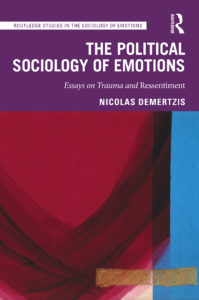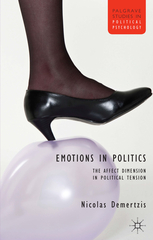The Political Sociology of Emotions: Essays on Trauma and Ressentiment
Author: Nicolas Demertzis
Publisher: Routledge, 2020, 266 pages
ISBN 9780815380733
Links: Amazon; Routledge; Taylor & Francis

The Political Sociology of Emotions articulates the political sociology of emotions as a sub-field of emotions sociology in relation to cognate disciplines and sub-disciplines.
Far from reducing politics to affectivity, the political sociology of emotions is coterminous with political sociology itself plus the emotive angle added in the investigation of its traditional and more recent areas of research. The worldwide predominance of affective anti-politics (e.g., the securitization of immigration policies, reactionism, terrorism, competitive authoritarianism, nationalism and populism, etc.) makes the political sociology of emotions increasingly necessary in making the prospects of democracy and republicanism in the twenty-first century more intelligible.
Through a weak constructionist theoretical perspective, the book shows the utility of this new sub-field by addressing two central themes: trauma and ressentiment. Trauma is considered as a key cultural-political phenomenon of our times, evoking both negative and positive emotions; ressentiment is a pertaining individual and collective political emotion allied to insecurities and moral injuries. In tandem, they constitute fundamental experiences of late modern times. The value of the political sociology of emotions is revealed in the analysis of civil wars, cultural traumas, the politics of pity, the suffering of distant others in the media, populism, and national identities on both sides of the Atlantic.
Emotions in Politics: The Affect Dimension in Political Tension
Editor: Nicolas Demertzis
Publisher: Palgrave Macmillan, 2013, 336 pages
Links: Amazon; Palgrave

Prompted by the ‘affective turn’ within the entire spectrum of the social sciences, this books brings together the twin disciplines of political psychology and the political sociology of emotions to explore the complex relationship between politics and emotion at both the mass and individual level with special focus on cases of political tension.
A role call of contributors from across the world and at the forefront of academic research in both disciplines combine the historical, cultural and socio-psychological conceptualizations of the political sociology of emotions with the study of opinion-making and electoral choice that characterises political psychology which previous studies have considered in isolation.
The result is a compelling collection that sheds new light on the role of emotion in politics through analysis that covers both the micro and macro levels and as such is important reading for students and scholars of both political psychology and the sociology of emotions.
Cultural Theory and Political Culture: New Directions and Proposals
Author: Nicolas Demertzis
Studentlitteratur, Lund, 1985, 280 pages

I have attempted to synthesize various strands of modern social and political theory into a meaningful framework, advancing aspects of others’ important arguments that seem to me unfinished, for example, Bauman’s culture-as-praxis thesis and Offe’s insights into what a contemporary theory of political culture would be.
Yet it is up to the reader to judge whether I succeeded in filling some gaps in theory or whether the line of argumentation I followed was the appropriate one.